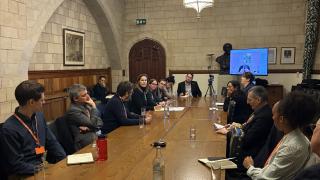
The third expert meeting on Lethal Autonomous Weapon Systems (LAWS) – informally known as ‘killer robots’ – marked a welcome step towards a tangible outcome. However, UNA-UK is concerned about the slow progress towards securing appropriate regulation of LAWS.
Held in Geneva in April, the third meeting of experts on the Convention on Certain Conventional Weapons (CCW) saw five countries calling for a pre-emptive ban on fully autonomous weapons systems, bringing the total number of supporting nations to 14.
States in attendance also unanimously agreed to recommend that discussions on LAWS should continue with the formation of a Group of Governmental Experts. Provided there is a consensus at the CCW’s Fifth Review Conference in December 2016, the Group will meet for six weeks between 2017 and 2018 to discuss and decide upon “possible recommendations of options for addressing lethal autonomous weapons systems”.
As an active member of the Campaign to Stop Killer Robots, UNA-UK welcomes the recommendations, which, if adopted, would result in talks moving from an ‘informal’ to a ‘formal’ status at the UN. However, we believe that more concrete action could be taken over the coming two years than just exploring “options”.
Lack of UK leadership
Ahead of the CCW meeting, UNA-UK and several other organisations wrote to the Foreign Secretary, Philip Hammond, to address some key concerns regarding the UK’s stance on this particular topic. In the joint letter, we urged the UK to express public support for the principle of ‘meaningful human control’ over weapons systems at the CCW meeting – a move that could have a “positive consensus-building effect internationally”.
Despite Mr Hammond’s assurances last year that “the UK is not developing and has no plans to develop LAWS”, the UK has not joined the aforementioned 14 states in calling for a pre-emptive ban on ‘killer robots’. As a major developer of advanced military equipment, the UK has a special responsibility to play a progressive role at these CCW meetings and be at the forefront of discussions to prevent the future development of such weapons. It concerning to see a lack of UK leadership on this matter.
As specified in our letter to Mr Hammond, UNA-UK will continue to call on the UK Government to develop its statements on LAWS into a clear policy that sets out how the Government will ensure that its weapons systems remain under ‘meaningful human control’ – a principle which the UK Government has yet to explicitly support.
This article will be updated once a response is received from Mr Hammond.






